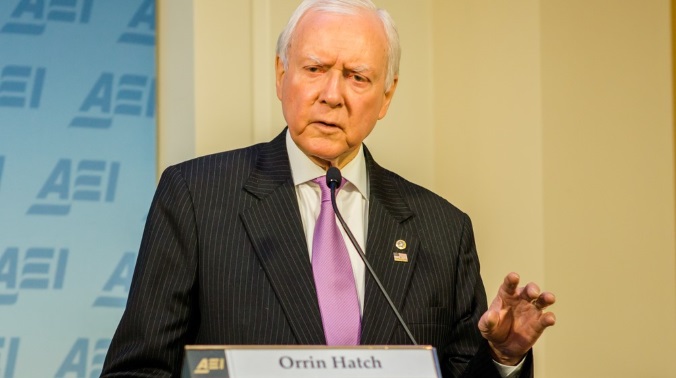In a potentially game-changing development for the medical marijuana community, Republican Senator Orrin Hatch, who has represented Utah since 1977 and is well known for his hardline conservatism, recently introduced a bill to the Senate that would streamline medical research on cannabis at the federal level.
The Marijuana Effective Drug Study Act of 2017, or MEDS Act, has widespread bipartisan support and was co-sponsored by Republicans Senators Cory Gardner (CO) and Thom Tillis (NC), as well as Democrat Senators Brian Schatz (HI) and Chris Coons (DE). If passed, the MEDS Act would make it easier for researchers across the country to study cannabis’ therapeutic potential and grant fast-track approval from the FDA for new medical marijuana products. It would also require the National Institute on Drug Abuse (NIDA) to create national guidelines for the production of marijuana as well.
“Compounds found in marijuana have shown promise for treating a wide-range of diseases and disorders,” Hatch said as he introduced the bill to the Senate on September 13th. “But because of bureaucratic red tape, there is a lack of sufficient evidence about the safety and efficacy of these compounds.”
Cannabis and the Opioid Epidemic
Senator Hatch also spoke out specifically about the opioid epidemic in America and the ability of marijuana to ease addiction.
“In Utah and across the nation, opioid abuse continues to ravage good, hardworking families who have fallen captive to the tyranny of addiction,” he said. “Because Utahns have watched their family members, friends, and neighbors grapple with this epidemic, many are seeking non-narcotic alternatives that can help with pain. Medical marijuana is just one such alternative. And after careful, deliberative thought, I’ve concluded that it’s an alternative worth pursuing.”
The MEDS Act is just the latest in a steady wave of support from the right for opening up medical marijuana to a wider swath of America. Earlier this year, The American Legion (the largest veteran’s organization in the USA) wrote a letter to President Trump that urged him to reclassify cannabis to allow more research and enable veterans, who suffer disproportionately from disorders like opioid addiction and PTSD, to have easier access to this natural medicine.
The letter from The American Legion prompted the Secretary of Veteran’s Affairs, David Shulkin, to speak out and admit that the federal government was limiting the department’s ability to provide marijuana relief to the high number of addictions and suicides among the veteran population.
During Hatch’s speech, the 83-year-old senator also brought up the ability of cannabis to treat epilepsy, citing a personal story from his home state.
“Take the difficult case of a young man from Eagle Mountain, Utah, who suffers from a number of different epileptic disorders and developmental ailments. My friend regularly takes 17 pills on a daily basis, yet continues to have seizures regularly,” Hatch told the Senate.
“Compounds found in marijuana could significantly mitigate the severity of my friend’s seizures and even help him lead a normal life. But current regulations prevent the development of any such treatment from going forward. So this young man is left to suffer. Luckily, the MEDS Act changes that; it updates the law for the 21st century, allowing for groundbreaking research on the potentially life-saving benefits of medical marijuana.”
The Benefits of CBD Oil
Hatch also mentioned CBD oil as a powerful medicine that he wants to see approved for a wider population and funded for research.
“My proposal would also allow for the commercial production of drugs developed from marijuana once they have been approved by the FDA,” Hatch said in his speech, “I’m pleased with the legislation Senator Schatz and I have been able to craft surrounding CBD oil and medical research. We are committed to seeing that this bill becomes law.”
The MEDS Act echoes other bipartisan-supported bills introduced this year that aim to break the federal government’s stranglehold on medical marijuana research. Those include the Cannabidiol Research Expansion Act, which focuses specifically on CBD and its potential as a treatment for epilepsy, as well as the CARERS Act (Compassionate Access, Research Expansion, and Respect States), which will protect individuals in states where marijuana is legal from federal prosecution.
End Game for Federal Prohibition?
With wave after wave of bipartisan-supported legislation targeting the Trump administration, it is only a matter of time until the executive branch has no choice but to give in to the will of the people and their elected representatives and open up medical marijuana research and access at a much wider level.
Even though the current Attorney General, Jeff Sessions, has come out explicitly against cannabis access and made statements like “good people don’t smoke marijuana,” he, too, is a public servant sworn to uphold the laws of the land. In trying to stand up against overwhelming popular opinion, the right of individual states to pass and enforce their own laws, and the new bipartisan support for marijuana legalization in both the House and Senate, Sessions finds himself in a battle where he is simply outmatched.

